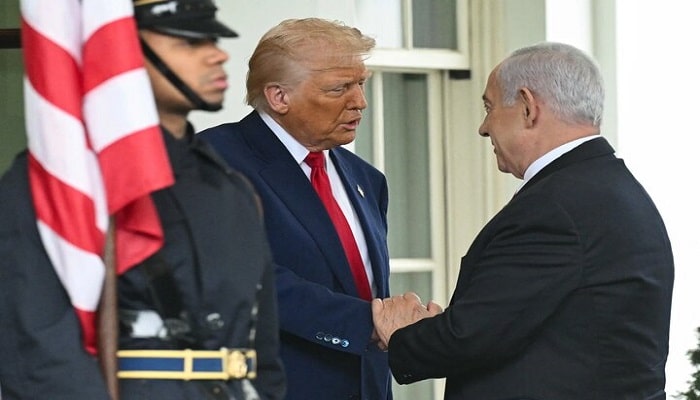PNN – The Israeli Prime Minister left Tel Aviv for Washington for the umpteenth time, and along with this trip, there has been much speculation about the goals of this trip and the meeting with the US President.
On the morning of Monday, July 7, 2025, Israeli Prime Minister Benjamin Netanyahu left Ben Gurion Airport for Washington for the umpteenth time, amid much speculation about his intentions for meeting Trump again. The possibility of a ceasefire in Gaza, the expansion of the Abraham Accords, and ultimately an attempt to convince Trump to drag the United States into a war with Iran appear to be among the Likud Party leader’s main goals in his trip to North America.
Of course, at this stage of the negotiations, it is unlikely that Saudi Arabia intends to join the Abraham Accords (for now) without obtaining key concessions such as “the right to enrich,” “a complete cessation of the Gaza war,” or “acceptance of the two-state idea,” and countries such as Syria, Lebanon, and even Qatar have a better chance of joining this agreement. Some experts believe that during the meeting with Trump, the Israeli Prime Minister will raise other issues, such as closing the four corruption cases, ensuring that the cabinet does not fall if the Haredis leave the cabinet, and ultimately addressing the situation of the Islamic resistance in Iraq.
The right-wing prime minister intends to use the power of the “mainstream media” to falsely portray himself as the victor in the 12-day battle with Tehran, turning some of Tel Aviv’s limited, tactical gains into a major strategic victory. Despite Trump’s support, Netanyahu’s path does not appear to be so smooth.
Read more:
Victory show in Washington
Just hours after the “Blessed Victory” operation against the CENTCOM command center in West Asia and the targeting of the Beersheba region by the Revolutionary Guards’ missile units, Trump tried to pave the way for a cessation of war and a ceasefire between Iran and the Zionist regime by using Doha as a mediator. This “freezing of tensions” situation, before being caused by the Zionist regime’s strikes, was the result of Iran’s missile power dictating to the Zionist defense systems and successfully bypassing them. Considering the ratio of Iran’s missile strikes to the level of general resilience in the occupied territories, opinion polls believe that the Zionist regime could no longer tolerate receiving strikes from advanced Iranian missiles such as Sejil and Khorramshahr. Just when the Israeli regime’s missile defense systems were running out of ammunition, the US government intervened to save the Zionists.
It also seems that the Israeli Prime Minister intends to use the pretext of fighting members of the resistance axis and reaching a (temporary) ceasefire in Gaza to pave the way for the expansion of the Abraham Accords. Beyond the aforementioned goals, it seems that the leader of the Likud Party is pursuing only one goal in staging this show, and that is to remain in power and escape accountability due to the existence of a corruption case.
Does Netanyahu want to stop the war in Gaza?
According to the news line followed by the media, negotiating a 60-day ceasefire in Gaza is one of Netanyahu’s main goals during his trip to Washington! Accordingly, regional media outlets such as Al Jazeera are analyzing the Israeli Prime Minister’s meeting with US Secretary of State Marco Rubio and US Special Representative for the Middle East Steve Whittaker in this context.
At the same time, right-wing forces such as Itamar Ben-Gweir have openly criticized Netanyahu, using aggressive language, believing that the government should stop procrastinating and vigorously pursue the goal of “destroying Hamas” instead of negotiating a ceasefire.
Regardless of whether this rift in Netanyahu’s government is genuine or not, opposition leaders such as Yair Lapid assured Netanyahu that if the extremist forces left the cabinet, they would quickly join the government to pave the way for the release of the 20 remaining prisoners in Gaza.
Selling peace to Arab countries
Another important agenda for Netanyahu during his trip to Washington is the expansion of the Abraham Accords. In recent days, Israeli think tanks and experts, focusing on the “Syrian issue,” believe that normalizing relations with Damascus is possible, because the new regime of Abu Muhammad al-Julani desperately needs American support while stopping the Israeli regime’s attacks in southern Syria. According to news published in the media, “Jolani” is simply seeking recognition of his government.
Now, six months after the ceasefire between Lebanon and the Zionist regime, American moves to achieve the two goals of “disarming Hezbollah” and “Beirut joining the Abraham Accords” have increased significantly. It seems that the Lebanese government intends to give a “positive response” to the request of the Trump and Saudi governments and enter the process of normalizing relations with the Zionist regime, under the pretext of the continued presence of the Zionists in southern Lebanon. The military movements of the Zionist regime in the last 48 hours and Tel Aviv’s aggressive approach can be analyzed in this context.
Benefit of speech
The experience of the last twenty-one months has shown that whenever Netanyahu or one of his senior government officials travel to Washington, a significant event has occurred in the West Asian region. From the attack on the Iranian consulate in Damascus to the assassination of Sayyed Hassan Nasrallah, the Secretary General of the Lebanese Hezbollah, it demonstrates complete coordination between Washington and Tel Aviv.
Some analysts believe that after spending billions of dollars, the Zionists have no intention of seeking to end the endless wars in the Middle East. Accordingly, focusing too much on issues such as establishing a ceasefire in Gaza or raising the issue of expanding the Abraham Accords could be a kind of deception operation aimed at committing new evil against the resistance in Yemen, Iraq, Lebanon, or even the Islamic Republic of Iran.

